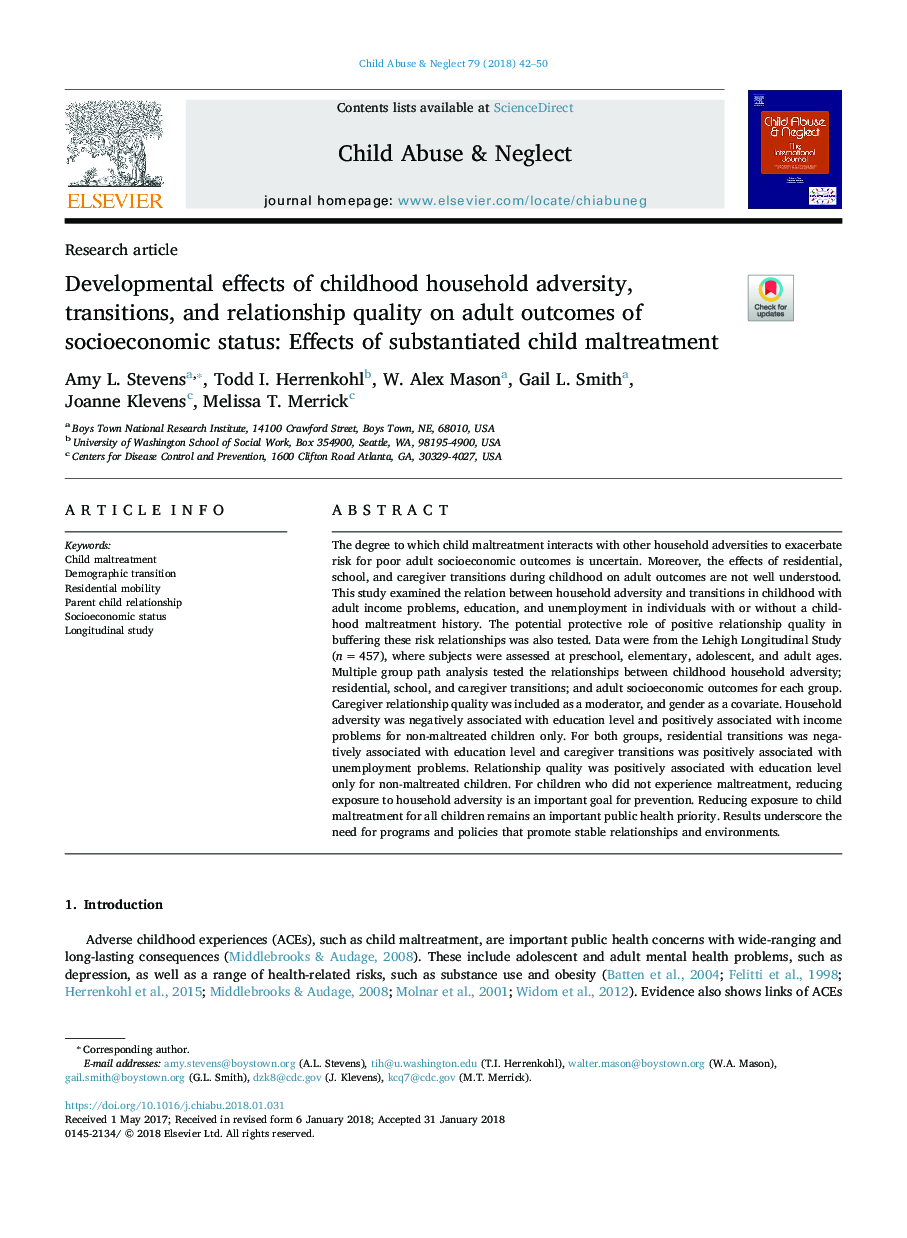| کد مقاله | کد نشریه | سال انتشار | مقاله انگلیسی | نسخه تمام متن |
|---|---|---|---|---|
| 6831935 | 1434349 | 2018 | 9 صفحه PDF | دانلود رایگان |
عنوان انگلیسی مقاله ISI
Developmental effects of childhood household adversity, transitions, and relationship quality on adult outcomes of socioeconomic status: Effects of substantiated child maltreatment
ترجمه فارسی عنوان
اثرات توسعه ناهنجاری، تغییرات و کیفیت ارتباطات دوران کودکی در مورد نتایج بزرگسالان وضعیت اجتماعی و اقتصادی: اثر خشونت مبتنی بر اثبات شده
دانلود مقاله + سفارش ترجمه
دانلود مقاله ISI انگلیسی
رایگان برای ایرانیان
کلمات کلیدی
بدرفتاری با کودک، انتقال دموگرافیک، تحرک مسکونی، رابطه والدین فرزند، وضعیت اجتماعی و اقتصادی، بررسی طولی،
موضوعات مرتبط
علوم پزشکی و سلامت
پزشکی و دندانپزشکی
پریناتولوژی (پزشکی مادر و جنین)، طب اطفال و بهداشت کودک
چکیده انگلیسی
The degree to which child maltreatment interacts with other household adversities to exacerbate risk for poor adult socioeconomic outcomes is uncertain. Moreover, the effects of residential, school, and caregiver transitions during childhood on adult outcomes are not well understood. This study examined the relation between household adversity and transitions in childhood with adult income problems, education, and unemployment in individuals with or without a childhood maltreatment history. The potential protective role of positive relationship quality in buffering these risk relationships was also tested. Data were from the Lehigh Longitudinal Study (nâ¯=â¯457), where subjects were assessed at preschool, elementary, adolescent, and adult ages. Multiple group path analysis tested the relationships between childhood household adversity; residential, school, and caregiver transitions; and adult socioeconomic outcomes for each group. Caregiver relationship quality was included as a moderator, and gender as a covariate. Household adversity was negatively associated with education level and positively associated with income problems for non-maltreated children only. For both groups, residential transitions was negatively associated with education level and caregiver transitions was positively associated with unemployment problems. Relationship quality was positively associated with education level only for non-maltreated children. For children who did not experience maltreatment, reducing exposure to household adversity is an important goal for prevention. Reducing exposure to child maltreatment for all children remains an important public health priority. Results underscore the need for programs and policies that promote stable relationships and environments.
ناشر
Database: Elsevier - ScienceDirect (ساینس دایرکت)
Journal: Child Abuse & Neglect - Volume 79, May 2018, Pages 42-50
Journal: Child Abuse & Neglect - Volume 79, May 2018, Pages 42-50
نویسندگان
Amy L. Stevens, Todd I. Herrenkohl, W. Alex Mason, Gail L. Smith, Joanne Klevens, Melissa T. Merrick,
